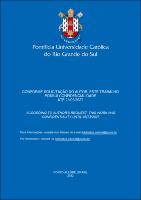| Share record |


|
Please use this identifier to cite or link to this item:
https://tede2.pucrs.br/tede2/handle/tede/10238| Document type: | Dissertação |
| Title: | O poder (neuro)psiquiátrico na sociedade contemporânea : a psicopatologização do cotidiano como forma de controle social |
| Author: | Angel, Camila de Oliveira  |
| Advisor: | Amaral, Augusto Jobim do |
| ???metadata.dc.contributor.advisor2???: | Dias, Felipe Da Veiga |
| Abstract (native): | De modo geral, esta pesquisa pretende demonstrar como, na atual era do neurocapitalismo e das alianças entre (neuro)psiquiatria, neurociências e psicofarmacologia, emergiu uma realidade social em que o sofrimento psíquico é extremamente disseminado, abarcando um número cada vez maior de pessoas e, principalmente, de situações. Com o passar dos anos, a quantidade de indivíduos acometidos por algum transtorno mental aumentou drasticamente, caracterizando uma verdadeira epidemia. Desta maneira, observando a relevância do tema mencionado, o presente estudo questiona como se constituiu o processo de psicopatologização do cotidiano que assola a sociedade contemporânea? A hipótese inicial é que há um duplo movimento no âmago deste problema: ao mesmo tempo em que se reconhece que hoje o próprio cotidiano estimula o aumento do mal-estar, também existem práticas que, ao invés de conterem o número de casos, na verdade, apenas auxiliam na sua expansão. Ou seja, trata-se de um processo paradoxal, que traz considerações extremamente importantes para o âmbito dos estudos criminológicos sobre violência (em seu sentido mais amplo) e sobre controle social. Portanto, para que se possa montar uma cartografia dos diferentes caminhos (e interesses) que suplementam esse mecanismo – compreendido, antes de tudo, como uma forma eficiente de dominação – a estratégia metodológica utilizada será uma revisão bibliográfica de cunho interdisciplinar, que vai ter como ponto de partida o arcabouço teórico foucaultiano sobre as relações de poder e de governo que permeiam a psiquiatria. Assim, primeiramente, o objetivo é entender a influência da esfera econômica do (neuro)capital e da matriz neoliberal na modulação das subjetividades, bem como na ampliação do mal-estar. Posteriormente, tendo em vista a relevância da neurociência e da farmacologia para as novas práticas que se instalaram no âmbito dos cuidados em saúde mental, o foco será demonstrar como a atividade (neuro)psiquiátrica e a (re)medicalização da população também auxiliaram, fortemente, na constituição do paradoxo que forma o processo de psicopatologização referido e os danos que dele decorrem. Enfim, com isso, será possível mostrar que para além dos discursos progressistas que envolvem essas práticas, existe uma forma silenciosa de violência a qual deve ser urgentemente evidenciada. |
| Abstract (english): | In general, this research intends to demonstrate how, in the current era of neurocapitalism and alliances between (neuro) psychiatry, neurosciences and psychopharmacology, a social reality has emerged in which psychological suffering is extremely widespread, encompassing an increasing number of people and, mainly, of situations. Over the years, the number of individuals affected by some mental disorder has increased dramatically, characterizing a true epidemic. Thus, observing the relevance of the theme, the present study asks how the process of psycho-pathologization the daily life that plagues contemporary society was constituted? The initial hypothesis is that there is a double movement at the heart of this problem: at the same time as it is recognized that today, everyday life stimulates the increase in malaise, there are also practices that, instead of containing the number of cases only assist in its expansion. In other words, it is a paradoxical process, which brings extremely important considerations to the scope of criminological studies on violence (in its broadest sense) and on social control. Therefore, to assemble a cartography of the different paths (and interests) that supplement this mechanism - understood, above all, as an efficient form of domination - the methodological strategy used will be an interdisciplinary bibliographic review, which will have as starting point the Foucaultian theoretical framework on the power and government relations that permeate psychiatry. So, first, the objective is to understand the influence of the economic sphere of (neuro) capital and the neoliberal matrix in the modulation of subjectivities, as well as in the expansion of malaise. Subsequently, in view of the relevance of neuroscience and pharmacology for the new practices that have been installed in the context of mental health care, the focus will be to demonstrate how the (neuro) psychiatric activity and the (re) medicalization of the population have also helped, strongly, in the constitution of the paradox that forms the referred psycho-pathologization process and the damages that result from it. Anyway, with this, it will be possible to show that in addition to the progressive discourses that involve these practices, there is a silent form of violence that must be urgently highlighted. |
| Keywords: | Psiquiatria Neurociência Controle Social Farmacologia Neurocapitalismo |
| CNPQ Knowledge Areas: | CIENCIAS SOCIAIS APLICADAS::DIREITO |
| Language: | por |
| Country: | Brasil |
| Publisher: | Pontifícia Universidade Católica do Rio Grande do Sul |
| Institution Acronym: | PUCRS |
| Department: | Escola de Direito |
| Program: | Programa de Pós-Graduação em Ciências Criminais |
| Access type: | Acesso Aberto |
| Fulltext access restriction: | Trabalho será publicado como artigo ou livro |
| Time to release fulltext: | 60 meses |
| Date to release fulltext: | 23/05/2027 |
| URI: | https://tede2.pucrs.br/tede2/handle/tede/10238 |
| Issue Date: | 25-Mar-2021 |
| Appears in Collections: | Programa de Pós-Graduação em Ciências Criminais |
Files in This Item:
| File | Description | Size | Format | |
|---|---|---|---|---|
| DIS_CAMILA_DE_OLIVEIRA_ANGEL_CONFIDENCIAL.pdf | CAMILA_DE_OLIVEIRA_ALGEL_DIS | 410.96 kB | Adobe PDF |  Download/Open Preview |
Items in DSpace are protected by copyright, with all rights reserved, unless otherwise indicated.




